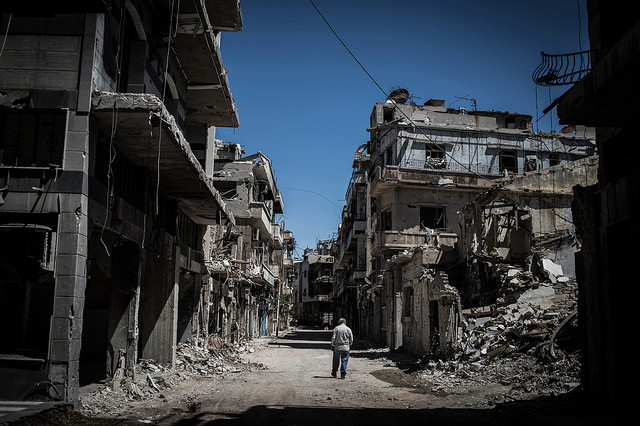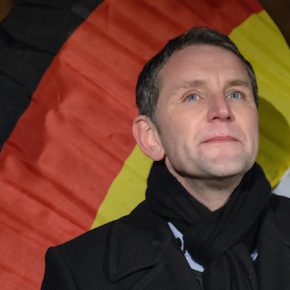Foreign intervention and the many proxy groups fighting on all sides of the conflict in Syria have further polarized the war and complicated the rules for accountability when it comes to civilian protection.
BEIRUT – The faces of Syrian president Bashar al-Assad and his three main foreign allies – from Russia, Iran and Lebanon – smiled down at the streets of Aleppo from large portraits draped outside a building in the Azizya neighborhood in December, just after pro-government forces had seized the eastern side of the city from the opposition. “Thank you from the people of Aleppo,” was written beneath their faces. The posters are a not so subtle reminder of the role foreign militaries have in Syria’s battlegrounds today.
Six years in, the progressively proxy nature of Syria’s war has left civilians more vulnerable to violence and society more fractured and susceptible to sectarian conflict. Even forces fighting on the same side have competing interests, and the fragmentation of command blurs accountability and threatens cease-fires.
“No one has the interest of protecting civilians,” said Dr. Zaidoun al-Zoabi, head of the Union of Syrian Medical Relief Organizations (UOSSM). Regardless of whether an area is government- or opposition-held, there is no single chain of command or solitary faction in control, al-Zoabi pointed out, and competing militias obstruct humanitarian aid to civilian populations under their control. “Unfortunately, this has become the norm.”
The nationwide cease-fire brokered by Russia and Turkey on December 30 has done little to stop fighting and protect civilians outside of Damascus, namely in the Wadi Barada region northwest of the capital. The water-rich area is the capital’s main water supply, a critical resource and pressure card for whoever controls the taps. Continued clashes have left nearly 4 million people without drinking water for more than three weeks. Government forces accused rebels of polluting the capital’s water sources while rebels said the government’s airstrikes destroyed the main water plant. Attempts to calm the fighting and fix the water plant have failed; on Sunday, shelling by pro-government forces reportedly killed 12 civilians in a shelter for people displaced by fighting after rebels were accused of assassinating a government negotiator sent to to repair the water infrastructure.
To Iran and its Lebanese ally Hezbollah, the area between Damascus and the Lebanese border is of more strategic value than the nascent truce, especially with President-elect Donald Trump’s administration heading into the White House, said Dr. Ziad Majed, a professor of Middle East studies at the American University of Paris.
“The Iranians would have preferred to avoid the cease-fire now and to maintain military pressure on the opposition at least until January 20 [Trump’s inauguration day],” said Majed. “Trump and his discourse appear to be very pro-Russian in Syria and elsewhere, [but] he is also very hostile and aggressive in the terminology he is using against the Iranians.”
Taking control of all areas between Damascus and the Lebanese border would allow the Iranian-backed Lebanese militia Hezbollah freedom of movement in its zones of influence, Majed said, and make Iran the strongest actor in the Damascus region.
“Damascus is the capital and where Assad is, and Iran wants to be more present there than any other actor – even an ally like Russia – because this would give them an advantage when it comes to a political decision,” Majed said. “They will keep some cards, and cards around Damascus are the most important to them now.”
As a result, civilians throughout the country are suffering and are categorized – even in death – by the groups who control their localities, said Bassam al-Ahmad, cofounder and CEO of the Syrians for Truth and Justice, a nonprofit advocacy group documenting violations in Syria.
“The ones living in government-held areas are accused of being shabiha, civilians in opposition-held areas are labelled ‘terrorists,’ civilians in Kurdish-controlled Qamishli are called [Turkish-Kurdish] PKK – there is a terrible stereotyping of civilians by everyone,” al-Ahmad said.
Foreign intervention has not only made for competing interests, but has further polarized the conflict, said al-Ahmad, because it “happened on a sectarian basis.” Iranian-backed militias aiding the government have largely come bearing Shiite slogans, while the fragmented, largely Sunni opposition has found support from Sunni Gulf states like Saudi Arabia and Qatar, and the predominantly Sunni AKP party governing Turkey. The so-called Islamic State and former al-Qaida affiliate Jabhat Fatah al-Sham (JFS) have also used sectarian rallying cries to bring in foreign recruits.
In December, Syrian government forces supported by Russian air raids and Iranian-backed ground troops took complete control of Aleppo following a four-year-battle with rebel forces for Syria’s largest city. Hundreds of civilians were killed by government airstrikes and rebel shelling in the final weeks of the offensive, and tens of thousands of residents from the formerly rebel-held eastern side of the city were forcibly displaced. Iranobjected to an initial “evacuation” deal brokered by Russia and Turkey for besieged residents of eastern Aleppo “because the deal was reached without Assad or Iran’s involvement,” according to the Guardian. A new deal was reached that included a simultaneous evacuation of residents besieged by rebels in the two predominantly Shiite towns of Fuaa and Kafraya in Idlib. Located in northwestern Syria, the province is controlled by an assortment of rebel and Islamist factions, with Jabhat Fatah al-Sham at the forefront.
“The civilians are essentially being used as bargain chips in sectarian proxy deal-making,” said Aymenn Jawad al-Tamimi, a fellow at the Middle East Forum. The evacuations from Aleppo were again suspended whenrebels set fire to buses intended to evacuate residents from Fuaa and Kafraya. The deal was sabotaged, al-Tamimi said, because “many rebels and their supporters clearly saw it as capitulation to Iran and the regime and believed that maintaining the siege with as many civilians inside as possible and perhaps even assaulting the towns would give them leverage.”
Druze residents of Idlib in Jabal al-Summaq north of Fuaa and Kafraya, al-Tamimi added, have no international backers for negotiations, and have had to renounce their faith under the administration of JFS.
And while civilians across front lines in Syria face daily acts of aggression from the disparate armed groups, the demarcated narratives reinforce prejudices and create a society more prone to recurrent conflict.
“It’s always easier to fall back on these lines of religion, when you can create the ‘us’ and the ‘them’ by something definitive that is not political,” said Dragana Kaurin, a Bosnian ethnographer formerly with theU.N. and UNICEF. “You harbor this group memory of this is what happened to ‘our people,’ and you don’t forget.”
Despite the sectarian divisions and multitude of foreign actors on the ground, the Syrian government is still primarily and legally responsible for any violations that occur against civilians. “It is on their territory, their civilians – this is not a disputed territory going through a Security Council for a two-thirds majority in the general assembly asking if it is sovereign – no, this is Syrian territory,” Kaurin said.
Yet civilian protection has not been an objective for the Syrian government; its security forces targeted unarmed civilian protesters in 2011 long before the conflict escalated into its current war. In an interview with French media, Assad insisted his government’s bombing of Aleppo was justified, adding that “every war is bad.”
The fragmentation of territories and military forces in Syria has created a chaotic landscape with unchecked violations of international law and increased civilian vulnerability, Majed said. But, he argued, the government’s attacks on civilians come from its own “ideology of violence,” rather than the introduction of foreign powers and proxies to the war.
The lack of accountability for those who commit war crimes and crimes against humanity in Syria is an “invitation to kill,” warned Majed, which will continue to encourage different forms of nihilism and radicalization in the region. “There will be no real solution – not to talk about ethics but just even pragmatically – if impunity is there.”
This article originally appeared on Syria Deeply, and you can find the original here. For important news about the war in Syria, you can sign up to the Syria Deeply email list. Photograph courtesy of Chaoyue 超越 PAN 潘. Published under a Creative Commons license.





